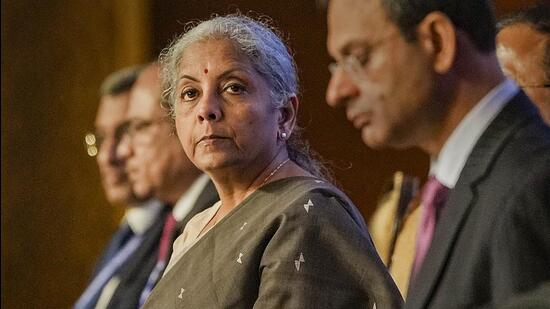NEW DELHI: Union finance minister Nirmala Sitharaman on Monday asked customs to use technology and share “actionable” intelligence to deter illegal trade while stressing on the need for enhanced international cooperation to bust smuggling networks and nab their kingpins.

As the nature and extent of smuggling is expanding with growing overseas trade, a “collective effort” to tackle the menace will be beneficial for all countries, she said at the Global Conference on Cooperation in Enforcement Matters in New Delhi.
She proposed that the Wold Customs Organisation (WCO) should help in evolving a basic global template of legislations and procedures to tackle this global problem, “especially in a technology-driven era” so that they are not mutually contradictory. WCO secretary general Kunio Mikuriya was also present at the event.
Sitharaman said customs departments across the world should take care of both – facilitating international trade, and prevention and deterrence of illegal trade. “It is important for all governments to know how to deter smuggling, how to deter activities which are endangering our wild fauna and flora,” she said stressing on the need to catch kingpins running smuggling networks.
Central Board of Indirect Taxes and Customs (CBIC) chairman Sanjay Kumar Agarwal said the world has witnessed a steady increase in international trade over the years with goods trade value reaching about $25 trillion in 2022 and value of services trade was about $7 trillion.
“As global markets continue to interconnect and economies flourish, there is a corresponding rise in the potential for the unlawful movement of restricted items such as antiques, cigarettes, gold, and endangered wildlife species, among others,” he said. The undercurrent of the illegal trade in drugs and psychotropic substances remains strong, he said. “Global drug trafficking is estimated to be worth $650 billion, contributing approximately 30% to the overall illicit economy,” he added.
Revenue secretary Sanjay Malhotra said that the fast-evolving modern digital world has blurred the boundaries of nation states and has created a daunting challenge for enforcement agencies across the world. “Smuggling is a multidimensional issue that has a detrimental impact on the economy of a country and its national security,” he added.
“This multi-billion dollar industry is involved in smuggling of a vast range of contraband, including drugs, weapons, counterfeit goods, wildlife etc… Therefore, one of the most effective ways to counter such cross-border crimes is to improve cooperation and coordination among different agencies and countries,” he said.
Agarwal said smugglers have become increasingly sophisticated, exploiting the intricacies of global supply chains and utilising technology to evade detection. “The rise of e-commerce and the use of crypto assets for cross-border transactions have added a layer of complexity, requiring a heightened focus on enforcement, regulation, and international cooperation to address the associated challenges,” he said.
The Indian Customs administration is deploying a risk-based approach in processing and mitigating the identified risks associated with customs declarations while consciously striking a balance between enforcement and facilitation, he said.
“We are actively exploring and harnessing cutting-edge technologies, including Big Data Analytics, Artificial Intelligence, Image Analytics, Natural Language Understanding, Network Analytics, and Open-Source Intelligence. To illustrate, Indian Customs is embarking on AI-based image analytics for centralised and automated risk detection in container scanning,” he added.
The government also launched Operation Shesha-IV, an initiative of the Indian Customs and the Department of Revenue Intellengence (DRI), to prevent smuggling of timber, especially the red sanders. The operation was first launched in 2015 by the Indian Customs with support of the Hong Kong Customs as a joint international operation. The operation is named after the Seshachalam forest of India to which the Red Sanders species is endemic. Earlier three editions of the operation were held in 2015, 2017 and 2019.
 Subscribe today by clicking the link and stay updated with the latest news!” Click here!
Subscribe today by clicking the link and stay updated with the latest news!” Click here!